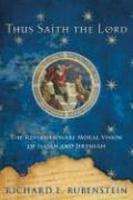
Book Summary
Rubenstein shows the evolution of moral codes and how they transformed the god of the Israelites from a local deity into Adonai, the universal sovereign who requires ethical behavior and demands the pursuit of justice for all people. This work will inspire readers to reexamine their beliefs and hear anew the words of the religious revolutionaries. In ancient Judea, Jeremiah and Isaiah advised kings and priests and watched the great armies of the ancient Near East sweep across the desert, threatening and overtaking their tiny country with its burgeoning faith. Across centuries a new view emerged based on their words: Might does not make right; we are all the children of one God. Both the beautiful words of Isaiah and the frightening words of Jeremiah helped form our contemporary ideas of justice, ethics, and faith. Richard Rubenstein shows us the evolution of our own moral codes and how they transformed the god of the Israelites from a local deity into Adonai, the universal sovereign who requires ethical behavior and demands the pursuit of justice for all people. A work of historical and religious insight, "Thus Saith the Lord" will inspire readers to reexamine their beliefs and hear anew the words of these religious revolutionaries.
Book Details
| Book Name | Thus Saith The Lord: The Revolutionary Moral Vision Of Isaiah And Jeremiah |
| Author | Richard E. Rubenstein |
| Publisher | Houghton Mifflin Harcourt (hmh) (Nov 2006) |
| ISBN | 9780151012190 |
| Pages | 258 |
| Language | English |
| Price | 1200 |








